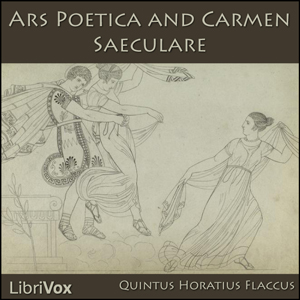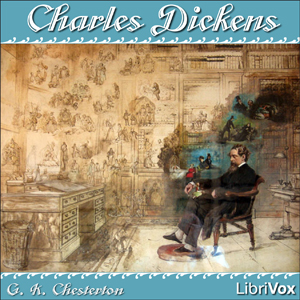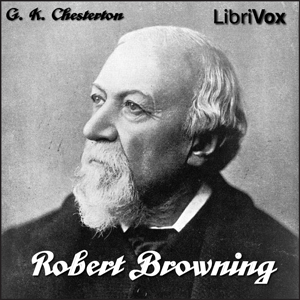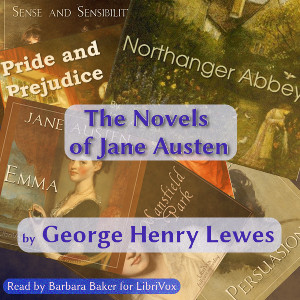G. K. Chesterton was a great admirer of Charles Dickens, and wrote a noted critique of Dickens' works expressing his opinion in his own inimitable style. (Summary by Karen Merline)
12 episodes
There is an old anecdote, probably apocryphal, which describes how a feminine admirer wrote to Browning asking him for the meaning of one of his darker poems, and received the following reply: "When that poem was written, two people knew what it meant--God and Robert Browning. And now God only knows what it means. (Summary by Gilbert Keith Chesterton)
24 episodes
InThis is an essay providing an extended analysis of the works of Norwegian playwright Henrik Ibsen and of Ibsen's critical reception in England. Shaw uses this "exposition of Ibsenism" to illustrate the imperfections of British society, using the idea of an imaginary "community of a thousand persons," divided into three categories: Philistines, Idealists, and the lone Realist.
The main discussion revolves around Ibsen's recurring topic of the strong character holding out against social hypocrisy, while stating in his essay's final sentence that the quintessence of Ibsenism is that "there is no formula." ( Michele Eaton)
19 episodes
Henry Augustin Beers, native of Buffalo, NY and professor of English at Yale, with the help of John Fletcher Hurst (1834-1903), Methodist bishop and first Chancellor of American University, has written a sweeping thousand 900 year history of English literature, up to the end of the 19th century. Although at times biased and sometimes misguided (as when he dismisses Mark Twain as a humorist noteworthy in his time but not for the ages), his research is sound and his criticism is interesting and quite often very balanced. In addition, the last chapter of each part is Hurst's synopsis of religious and theological literature in the language. This book is interesting for its point of view, but also useful as a jumping-off point for those interested in reading the classics. (Summary by Kalynda)
18 episodes

The Ars Poetica, by Horace, also known as Epistula ad Pisones, is a treatise on poetry written in the form of a letter, and published around 18 B.C. In it, Horace defines and exemplifies the nature, scope and correct way of writing poetry. This work, inspired by the book of the same name by Aristotle, is one of the most influential in Latin literature, and the source of famous concepts in poetics, such as "in medias res" and "ut pictura poesis". The text itself is a poem in 476 dactilic hexameters.The Carmen Saeculare, or "Song of the Ages", is a hymn written by Horace in 17 b.C. for the Ludi saeculares of the same year. It is believed that the poem was commissioned by the Emperor Augustus and sung by a choir of young men and women during the opening ceremony of the Games of the Century, a religious celebration that happened in Rome once every saeculum (century). The saeculum was considered to be the maximum length of a human life, which means the Games happened once every generation. The poem was written is nineteen sapphic stanzas, and in an elevated and religious tone. (Summary by Leni)
7 episodes
A lecture on the art of fiction, given by the English critic Walter Besant on April 25, 1884, and an answer to the lecture by American writer Henry James in the same year. (Summary by Julie VW)
3 episodes
This is the first volume of four which goes into the details of Characters from John Bunyan's books. This one is about characters of Pilgrims Progress. - Summary by fiddlesticks
26 episodes
Von den ältesten Zeiten bis zur Gegenwart
Eine Literaturgeschichte von einem Literaten!
Der Stil ist modern (für die PD), persönlich und amüsant zu lesen, z.B. "Er ist kein großer Dichter, aber ein Dichter: zu den Klassikern haben ihn nur die Fabrikanten von Klassikerliteratur gemacht: denen genügen Schiller, Goethe, Kleist aus Geschäftsgründen nicht, die Brautpaare verlangen beim Heiraten zur Komplettierung ihrer Wohnungseinrichtung eine ganze Klassikerausstattung: [...]"
1 - Einführung
2 - Nibelungen, Walter von der Vogelweide
3 - Hans Sachs, Martin Luther, Andreas Gryphius, Christoph von Grimmelshausen
4 - Lessing, Klopstock
5 - Schiller, Goethe
6 - Arnim, Brentano
7 - Heine, Mörike
8 - Keller, Fontane, Storm
9 - Morgenstern, Trakl
Die einzelnen Abschnitt behandeln neben diesen berühmten Autoren auch die jeweiligen Zeitgenossen.
9 episodes

Twenty years ago, now, I attempted (but was not especially successful in the task) to establish upon the personal knowledge that my own residence as a pupil in the historical Pensionnat in the Rue d'Isabelle, at Bruxelles gave me of the facts of Charlotte Brontë's relationships to Monsieur and Madame Heger, right impressions about the experiences and emotions she underwent between 1842 and 1846, and that supply the key and clue to the right interpretation of her genius. Every opinion I then ventured to state, not upon the authority of any special power of divination or of psychological insight of my own, but solely upon the authority of this personal knowledge of Monsieur and Madame Heger in my early girlhood, and also of the information I owed to the friendship and kind assistance given me, in my endeavour to rectify false judgments, by the Heger family, has quite recently, not only been confirmed, but established upon entirely incontrovertible evidence, by the generous gift made to English readers throughout the world of the key needed to unlock once and for ever the tragical but romantic 'Secret' of Charlotte Brontë. - Summary by Frederika MacDonald
12 episodes
Wenn man unter Poesie überhaupt die Kunst versteht, „uns durch einen freien Effekt unserer produktiven Einbildungskraft in bestimmte Empfindungen zu versetzen“ (eine Erklärung, die sich neben den vielen, die über diesen Gegenstand im Kurs sind, auch noch wohl wird erhalten können), so ergeben sich daraus zweierlei Forderungen, denen kein Dichter, der diesen Namen verdienen will, sich entziehen kann. Er muss fürs erste unsre Einbildungskraft frei spielen und selbst handeln lassen und zweitens muss er nichts desto weniger seiner Wirkung gewiss sein und eine bestimmte Empfindung erregen. - (aus dem Text)
2 episodes
George Bernard Shaw, a playwright with a few bones to pick of his own, undertakes a surgical analysis of the social philosophies underlying the work of Henrik Ibsen. Focusing his analysis on Ibsen's challenge to the conventional "ideals" which both Ibsen and Shaw consider the greatest evils in human society, Shaw summarizes and exposits sixteen of Ibsen's plays, seizing the opportunity to elucidate some of the principles dearest to himself. Some of the most striking passages reveal Shaw's radical feminist perspectives, some of which resonate as if a half-century ahead of their time. A fascinating revelation of the minds of two great and revolutionary writers (it's not always obvious whose voice is exactly whose), this always-timely book exposes hypocrisies still poisoning Society in the twenty-first century. - Summary by Expatriate
19 episodes
«Портреты русских поэтов»: Ахматова, Бальмонт, Балтрушайтис, Блок, Брюсов, Белый, Волошин, Есенин, Иванов, Мандельштам, Маяковский, Пастернак, Сологуб и Цветаева. Позднее эти очерки были переработаны и вошли в мемуары "Люди, Годы, Жизнь". С подборками стихов.Portraits of Russian Poets: Akhmatova, Balmont, Baltrushaitis, Blok, Bryusov, Bely, Voloshin, Esenin, Ivanov, Mandelshtam, Mayakovsky, Pasternak, Sologub, and Tsvetayeva. Later to become expanded in his memoir "People, Years, Life". Short verse selections are included. (Mark Chulsky)
28 episodes
An 1859 essay by the prominent philosopher and literary critic, G. H. Lewes, who was an enthusiastic promoter of the novels of Jane Austen at a time when they were yet to achieve great critical acclaim. Lewes was the life partner of the novelist George Eliot.
- Summary by barbara2
4 episodes
A collection of essays on 19th century novelists, both famous ones and those largely forgotten now. Among the writers presented most wrote in English, but three foreign authors are also discussed. Phelps taught a course on novels at a university and he added to those biographical essays some of his ideas about the importance of novels in the process of teaching about literature. (Summary by Piotr Nater)
15 episodes
Madame Germaine de Staël (1766-1817) was the daughter of the Swiss banker and statesman, Jacques Necker. Her mother hosted a popular Paris salon where intellectuals gathered, many of whom contributed to the education of the brilliant girl. After his fall from political power in 1781, her still-wealthy father was able to marry Germaine to Baron Erik Magnus Staël von Holstein, but the couple separated in 1797. A successful novelist, Madame de Staël was a fervent defender of J.J. Rousseau and of the ideals of the French Revolution. In 1792 she was forced to flee to England where she continued to socialize with such French luminaries as Charles Maurice de Talleyrand. After the death of Robespierre in 1794, she returned to Paris where she met and came to oppose Napoleon. (Pamela Nagami)
24 episodes
Margaret of Angoulême, Queen of Navarre (Marguerite de Navarre), (1492-1549), was the sister of Francis I, King of France. She was highly-educated and was courted by the future Henry VIII of England. However, at the age of seventeen, she was married by royal decree to the untutored dolt, Charles IV of Alençon. After his death she wed Henry II of Navarre by whom she had a daughter (the mother of the future Henry IV of France) and a son, who died in infancy. The author takes us with Margaret on her perilous journey over the Pyrenees to Spain to attempt to free her brother, Francis, held captive by the Holy Roman Emperor. Margaret's support for the first stirrings of the Reformation in France alarmed the Catholic conservatives of the Sorbonne. Her cycle of short stories, the "Heptameron," is still read and enjoyed today. (Pamela Nagami)
25 episodes
Elizabethan Demonology: An Essay in Illustration of the Belief in the Existence of Devils, and the Powers Possessed By Them, as It Was Generally Held during the Period of the Reformation, and the Times Immediately Succeeding; with Special Reference to Shakespeare and His Works
This Essay is an expansion, in accordance with a preconceived scheme, of two papers, one on "The Witches in Macbeth," and the other on "The Demonology of Shakespeare," which were read before the New Shakespeare Society in the years 1877 and 1878. The Shakespeare references in the text are made to the Globe Edition.
- Summary by Thomas Alfred Spalding
11 episodes

Emily Brontë (1818-1848) is best known for her only novel, "Wuthering Heights." She was born in Yorkshire, northern England, where her father was an Anglican curate. When Brontë was three years old her mother died of cancer. At the age of six she joined her three sisters briefly at the Clergy Daughters' School, where privations and abuse contributed to the deaths of two of them. Her elder sister, Charlotte, immortalized this terrible place in "Jane Eyre." In 1846 Emily Brontë, under the pseudonym Ellis Bell, published a selection of her poetry. In 1847 appeared her dark, gothic novel, "Wuthering Heights," with its Byronic anti-hero, Heathcliff. Brontë was shy, even reclusive, and never married. In the fall of 1848 she fell ill with inflammation of the lungs, probably due to rapidly-progressive tuberculosis, and died in December of that year, aged twenty-nine. This is a short biography of Brontë written by the British poet, novelist, and critic, Agnes Mary Frances Robinson (1857-1944). (Pamela Nagami)
20 episodes
Many books are dry and dusty, there is no juice in them; and many are soon exhausted, you would no more go back to them than to a squeezed orange; but some have in them an unfailing sap, both from the tree of knowledge and the tree of life. Here I have written about a few of these books which have borne me good company, in one way or another, -- and about their authors, who have put the best of themselves into their work. Such criticism as the volume contains is therefore mainly in the form of appreciation with reasons for it. So I send forth my new ship, hoping only that it may carry something desirable from each of the ports where it has taken on cargo, and that it may not be sunk by the enemy before it touches at a few friendly harbors. (Henry van Dyke)
13 episodes
Powys presents a set of literary devotions of great figures in Literature who have obsessed him. He attempts not so much a reasoned critique or any attempt to categorise these figures but rather, as he describes in the Preface: "to give [himself] up, absolutely and completely, to the various visions and temperaments of these great dead artists." Powys delivered popular lectures throughout the United States and was able to hold audiences in rapt attention for hours while speaking about great literature and writers, this book from the earlier part of his writing career gives us a little glimpse into what those lectures must have been like. - Summary by Keri Ford
19 episodes
This is the third and final volume of Isaac D'Israeli's monumental work Curiosities of Literature. It covers a great range of diverse topics, by no means limited to literature only, but also containing numerous essays on history, politics, and customs of English society. Therefore, this book will not only interest students of literature, but any reader should be able to find something matching his or her particular interests. - Summary by Carolin
62 episodes
A discussion about the life and works of the playwright Arthur Wing Pinero. The perfect accompaniment to the plays by Pinero available here at Librivox. (Refer to the etext for cast lists of plays - through 1901 - mentioned in the Section 12 Bibliography.) - Summary by ToddHW
12 episodes
C. H. Herford was Professor of English Literature at the Victoria University of Manchester in era when public lectures were published in pamphlet form. The six lectures in this collection span Herford's career at the University during the turbulent first two decades of the twentieth century. Taking a historical view, Herford covers a wide range of eras and writers in an exploration of the roots of English literature. - Summary by Phil Benson
7 episodes

"It was part of my daily work, for a good many years, to read the principal English newspapers and reviews; it has been part of my work, all the time, to read the more important English novels, essays, poetry and criticism. An American born and bred, I early noted, as everyone else in like case must note, certain salient differences between the English of England and the English of America as practically spoken and written—differences in vocabulary, in syntax, in the shades and habits of idiom, and even, coming to the common speech, in grammar. And I noted too, of course, partly during visits to England but more largely by a somewhat wide and intimate intercourse with English people in the United States, the obvious differences between English and American pronunciation and intonation.
Greatly interested in these differences—some of them so great that they led me to seek exchanges of light with Englishmen—I looked for some work that would describe and account for them with a show of completeness, and perhaps depict the process of their origin. I soon found that no such work existed, either in England or in America—that the whole literature of the subject was astonishingly meagre and unsatisfactory." - Summary by Mencken (Preface)
49 episodes
Poe’s famous narrative poem and the author’s reflections on its composition. (David Wales)
3 episodes
Mencken sharpens his pen and in a collection of short essays delivers acerbic opinions on issues and persons of the time. Among his targets in this volume (the first of six) are critics, H.G. Wells Thorstein Veblen, Arnold Bennett, William Dean Howells, Irvin S. Cobb. Mencken's critiques are delivered against a background of his own well known ethnic, racial, religious, and sectional prejudices. (It is said that the only thing Mencken loved about the Southern United States was his wife, who hailed from Alabama.) Not for the faint of heart, Mencken's prickly, yet unapologetic, prose reveals a window into American attitudes at the time they were written and their influences on the larger American culture. - Summary by DrPGould
21 episodes
Un ouvrage passionnant sur la Littérature, comment lire et aborder différents textes, romans, philosophiques, poétiques, pièces de théâtre, auteurs connus, plus complexes, etc... Une belle approche du "comment lire", un art qui est aussi une passion pour tous les amoureux de la langue. Une réflexion littéraire très enrichissante.
En Additif, un article très intéressant, sur l’orthographe, ... vaste débat..., et traité avec vivacité, érudition et grand talent par Émile Faguet.
Et, pour clore, un second et dernier additif : un aspect intéressant avec le Portrait littéraire, Nietzsche et les femmes. - Summary by Christiane Jehanne
13 episodes

This famous Shakespearean exploration illuminates its plays through the frame of character, while also weighing theme, mood, structure and poetics. In it, 19th-century critic William Hazlitt unveils Shakespeare's genius in creating and infusing characters with a life-likeness that often challenges, if not overshadows, more material human nature -- in both inner and outer worlds. As he writes: "The characters breathe, move, and live, ... think and speak and act just as they might do, if left entirely to themselves." The first printing sold out in weeks, and the second sold briskly, until a harsh and antagonistic appraisal in The Quarterly Review quelled sales altogether -- and unraveled Hazlitt's critical cachet in the eyes of the general public. Not until the mid-twentieth century were Hazlitt and his works re-evaluated, when he was finally recognized as one of Shakespeare's foremost critics of all time. In literary criticism, the renowned Harold Bloom ranks Hazlitt second only to Dr. Johnson. - Summary by Nemo
36 episodes
This book is not meant to be a History of English Literature, but an introduction for those who do not know much about it, or who may be thinking of it as a "dull, horrid thing" which they have to learn in school. I venture to hope that this book may become too dear to throw away when the study is done, and overall I have tried very hard not to write a "stuffy" book. Summary by Beth Thomas and the Introduction
20 episodes
In this famous early work of German philosopher Friedrich Nietzsche, he investigates the artistic characteristics of Apollonian (reason) and Dionysian (passion) characteristics in Greek art, specifically in Greek tragedy as it evolved. Then he applies his conclusions about Greek tragedy to the state of modern art, especially modern German art and specifically to the operas of Richard Wagner.
27 episodes
Бесконечно преданный русской литературе, Юлий Айхенвальд видел писателя как уникальную личность и не признавал литературных школ и течений. Oн погиб в Париже возвращаясь ночью от Набоковых погруженный в мысли о литературе, и попал под трамвай.
Эти очерки рассматривают только творчество, они не касаются биографических событий. Второй выпуск посвящен русским писателям XIX—XX вв. Некоторые очерки будут озвучены в следующем выпуске Силуэтов в более поздней редакции.
A connoisseur of the Russian literature, Yuly Eichenwald wrote about writers as unique persons, and not as members of schools and movements. His Silhouettes of Russian Writers are about their oeuvre, not biographies. - Summary by Mark Chulsky
22 episodes
This short history by the eminent British historian, Mandell Creighton, places Elizabeth and her reign within the context of 16th century European political, religious, and military events. Elizabeth overcomes her two great rivals, King Philip of Spain and Mary, Queen of Scots. England gradually unites behind her Queen, who survives multiple assassination plots. After the defeat of the Spanish Armada, the English, lightly taxed by their frugal sovereign, launch flourishing commerce enterprises. The author writes of the Protestant Reformation that "a change of belief meant a revolt from authority." In this age of individualism, personal daring, and a consciousness of national greatness, the golden age of Elizabethan literature breaks new ground in historiography, literary theory, poetry, and above all, drama. (Pamela Nagami, M.D.)
25 episodes

The Ordeal of Mark Twain analyzes the literary progression of Samuel L. Clemens and attributes shortcomings to Clemens' mother and wife. The Encyclopaedia Britannica says, Brooks' work "was a psychological study attempting to show that Twain had crippled himself emotionally and curtailed his genius by repressing his natural artistic bent for the sake of his Calvinist upbringing." Also, Brooks says, his literary spirit was sidelined as "...Mark Twain was inducted (with the success of 'Innocents Abroad') into the Gilded Age, launched, in defiance of that instinct which only for a few years was to allow him inner peace, upon the vast welter of a society blind like himself, like him committed to the pursuit of worldly success." And, still more disturbingly, Brooks maintains... "We shall see that in the end, never having been able to develop, to express itself, to fulfill itself, to air itself in the sun and the wind of the world, it turned as it were black and malignant, like some monstrous, morbid inner growth, poisoning Mark Twain's whole spiritual system. We have now to note its constant blind efforts to break through the censorship that had been imposed on it, to cross the threshold of the unconscious and play its part in the conscious life of this man whose will was always enlisted against it." The implication of all this begs the question, "What might a truly unleashed Mark Twain have produced?" For a recording of a New York Times review of this book, go this link: Review ( John Greenman & Wikipedia)
11 episodes
































